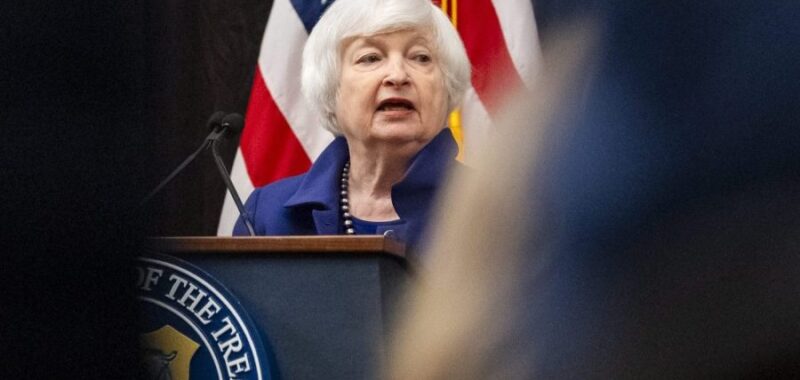
Former Treasury Secretary Janet Yellen weighed in on the Trump administration’s trade war Friday evening, blasting President Trump’s latest roll-out of import taxes on nearly all trading partners.
“This is the worst self-inflicted policy wound I’ve ever seen in my career inflicted on our economy,” she told CNN’s Anderson Cooper in an interview. “The Trump tariff plans are doing immense damage to our economy.”
“You can see that in the stock market, in the impact of these tariffs are expected to have on American households,” she added.
When asked how Wall Street and the economy could recover amid a volatile market sparked by Trump’s tariffs — which the president put on a 90-day hold amid negotiations, with the exception of China — Yellen didn’t appear optimistic. She specifically pointed to anxieties rising around bonds as an example.
“Well, I think that could take a long time to rebuild. Dollar assets have long been regarded as the safest in the world, especially U.S. treasury bonds and bills,” Yellen, “And what we saw this week was a sharp increase. One of the biggest increases on record over the space of a week in long term Treasury yields — almost 50 basis points. And at the same time a decline in the value of the dollar,” Yellen, who previously served as chair of the Federal Reserve, explained. “They form the core of the whole global financial system.”
“And what we saw this week was a sharp increase. One of the biggest increases on record over the space of a week in long term Treasury yields — almost 50 basis points. And at the same time a decline in the value of the dollar,” she added.
The Biden-era Treasury chief called it an “unusual pattern,” noting that “in chaotic times, usually Treasury yields fall. The Treasury bonds are a safe haven. People buy them. That’s not what’s happening now.”
Her comments come just over a week after the Trump administration imposed a 10 percent baseline tariff on nearly all foreign imports. The president also slapped dozens of nations with higher reciprocal taxes, though most fall under the three-month reprieve.
U.S. and Chinese officials have butted heads over recent days, with the world’s two largest economies engaged in their own tariff war. Trump has increased duties on Beijing to 125 percent on top of an existing 20 percent tariff on imported goods. China responded in kind, but said the 125 reciprocal tax would be the cap.
The reciprocal tariffs do not impact Mexico or Canada, which both face a 25 percent import tax on goods not covered under the 2020 trade agreement.
Rising concerns over global trade and the impact of the tariffs on consumer prices and inflation have risen the risk of a recession, experts have warned. Federal Reserve Chair Jerome Powell earlier this month suggested that economic harm from the import taxes were larger than anticipated.
The Fed chief and his colleagues had warned for months that additional tariffs would make it harder for the central bank to bring interest rates down — despite pressure from Trump.
Cooper on Friday asked Yellen what would happen if administration were to turn its ire on the Federal Reserve or Powell over his decision to keep rates steady amid the uncertainty.
“Well, it’s well understood that countries that have independent Central Banks exhibit better economic performance. And there’s a very good reason for that. It’s that independent Central Banks are not driven by politics,” she told the CNN host.
“When those Central Banks are politically driven, they tend to do things that are destabilizing to economies,” Yellen added.

